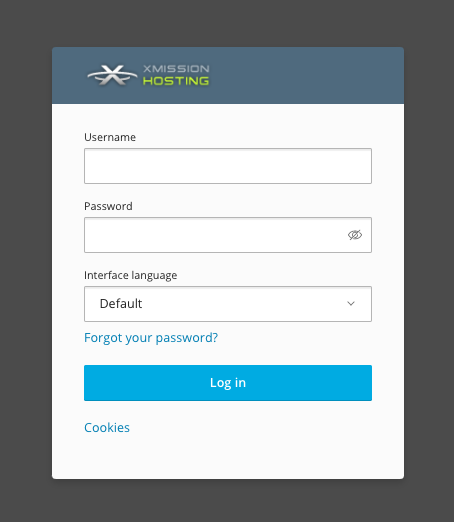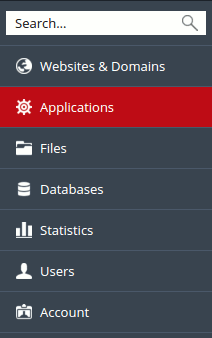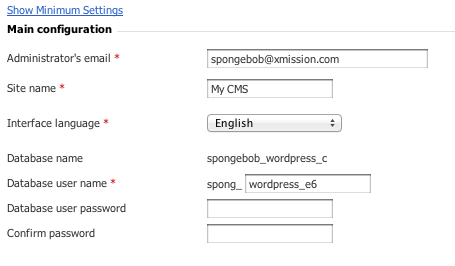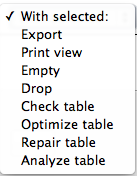WordPress: Difference between revisions
| Line 8: | Line 8: | ||
[[File:Plesk_main_login.png]] | [[File:Plesk_main_login.png]] | ||
<br><br> | <br><br> | ||
[[3]] Next select | [[3]] Next select Applications from the menu<br> | ||
[[File:web_domains.png]] | [[File:web_domains.png]] | ||
Revision as of 12:41, 26 September 2014
Wordpress one click install
XMission New Hosting Package
- To utilize the Wordpress once click install you will need to Login to your control panel.
1 Go to http://hosting.xmission.com
2 Enter your Username and Password

3 Next select Applications from the menu

7 Click OK and then go to Applications on the Menu Bar and choose WordPress Install
![]()
8 Click the check box to agree to the terms - and then choose next
9 Specify the location where this web application should be installed
NOTE by default it will install in a subdirectory called /wordpress - if you want to install in the root / remove the word wordpress from the box and follow the remaining instructions.

10 Administrative access to the application - you can choose to use your default username or create a new Admin user for Wordpress

- If no other changes are needed you can click install and you will be finished ..
11 If you want you can configure additional settings by clicking on Show All Settings

- Congratulations you have completed the One Click Install of Wordpress
Moving an Existing Wordpress to XMission Hosting
1 Follow the above section
2 Export the Database for your WordPress and save it to your local computer
- Most Hosting companies will use PHPMyAdmin - you can log into this and export your database.
3 Once your Database has been exported you will log into your control panel as stated above in Step 2 then click on Websites & Domains as in Step 3
4 Click on Databases

5 Choose the Database that reflects your Wordpress Install
![]()
6 Select webadmin icon located under Tools - This will launch PHPMyAdmin so you can import your WordPress Database

7 Once in PHPMyAdmin - select Database from the menu
![]()
8 Next Select your Database

9 Choose Check All under all the tables -
![]()
10 Where is says With Selected choose Drop

11 Choose Yes after you select Drop this will remove all the tables that the Pre-Installed WordPress has created and allow you to import your database.
12 Now choose Import from the menu bar
![]()
13 In the Section File to Import: Click on Choose File so you can select your database to import.

14 Once you have imported your database - you can then FTP your files to your new server. Use an FTP program like FileZIlla that is free and will work for Mac, Windows, and Linux
- IF you are using FileZilla fill in the following information:
- Host Name - your domain name (i.e. domain.com )
- Username - your FTP username
- Password - your FTP password
- When you FTP your files to your new Hosting - DO NOT include the wp-config.php or the .htaccess files
15 Once you have FTP'd all of your files - you can then log in to your Admin panel (i.e. http://domain.com/wp-admin/) you can log in with the same username and password that you always have.
- Once you have logged in you will want to Click on Settings > Permalinks make sure it is currently set to Default .. click Save .. This will crate a .htaccess file. Now you can set the Permalinks the way you want.
Your Site should now be up and running the way it was at your old host.
Moving your wordpress from one Domain to Another
1 Follow the sections above - However After Step 13 follow these instructions
2 Choose SQL from the menu bar
![]()
3 Insert the following:
UPDATE wp_options SET option_value = 'http://www.domain.com' WHERE option_name IN ('siteurl', 'home')
Insert that SQL query in the giant ‘Run SQL query/queries on database…’ field and change the http://www.domain.com to reflect the root level of the site you’re transferring to (so, if you’re moving WordPress to www.domain.com/bar make sure that the /bar is appended here)

4 Next you will want to run another SQL command:
UPDATE wp_posts SET post_content=(REPLACE (post_content, '{old url}','{new url}'))
If you’re moving from http://www.olddomain.com/blog to http://www.newdomain.com you’ll want {old url} to say ‘www.olddomain.com/blog’ and {new url} to say ‘www.newdomain.com’.)

- After you run the above commands your WordPress site should now reflect your new domain.
- Continue steps 14 and 15 above as you will also want to edit your settings in Wordpress to reflect your new Domain name
- Administration/Logging in
- Adding a Domain
- Adding MySQL Databases
- Adding/Managing DNS Records
- Managing Domain/Users
- Managing FTP Access/Users
- PHP Settings
- Previewing the Website
- Secure Your Sites
- Web Statistics
Additional Development Help
Applications
Domain Management
